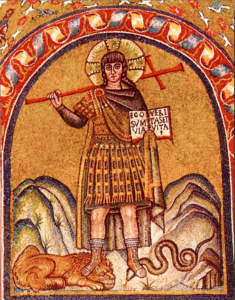Thoughts on Sunday’s Lessons for June 25, 2017
First Reading (Track One): Genesis 21:8-21We often turn to scripture for reassurance, looking for readings that bring us comfort and joy. Sunday’s readings are not quite like that. They challenge us, jolt our assumptions, and at the end, make us think about how our spirituality works. We begin with a particularly troubling story about Abraham, the patriarch of the chosen people, who followed God’s commands with exemplary faithfulness. Yet here we see Abraham doing something disturbing as he sends his slave, Hagar, and their son, Ishmael, out into the desert to die. Happily, God intervenes, saving Ishmael and promising them a bountiful future parallel to that of Abraham and Sarah’s son, Isaac. (Indeed, while Jews and Christians recognize Abraham as our patriarch through Isaac, the world’s Muslims trace their Abrahamic line through Ishmael.)
First Reading (Track Two): Jeremiah 20:7-13
The prophet Jeremiah is angry and upset. God has called him to prophesy to the people about the destruction that their failure to be righteous and just will bring upon them, but they will not listen. Worse, they laugh and deride him when he shouts about their impending peril. Anger builds up in his bones like a burning fire, and he cannot hold it in. Even his close friends wait for him to stumble. But Jeremiah knows that it is his persecutors who will stumble, for God is with him like a warrior at his side.
Psalm (Track One): Psalm 86:1-10, 16-17
Like Hagar with Ishmael in the desert, the Psalmist suffers in misery. He suffers in spite of his faith and trust in God. Recognizing that God is a God like no other, the God of all nations, who loves us even when we aren’t happy, he cries out his prayer, trusting in a good and forgiving God to answer him and make his heart glad.
Psalm (Track Two): Psalm 69: 8-11, (12-17), 18-20
This Psalm clearly serves as a foil to the Jeremiah reading. Like Jeremiah, the Psalmist spoke for God only to become the subject of scorn and reproach from his own friends and family, and even had songs sung about him by drunkards at the city gate. The Psalmist calls on God to save him from their hatred, to turn to him in compassion and save him from his enemies.
Second Reading: Romans 6:1b-11
In baptism, everything changes in our lives. This theme runs strongly throughout Paul’s letter to the Romans. Baptism unites us with Christ so that we share in his death and resurrection. In baptism we symbolically “die” to our old life enslaved by sin. In baptism we are born to a new life, freed from sin through God’s abounding grace. In baptism we become dead to sin and alive to God through Jesus.
Gospel: Matthew 10:24-39
This is surely one of the most difficult Gospel passages! It seems strange to see Jesus, the Prince of Peace, telling us that he has not come to bring peace but a sword! Family members set against each other, and we have to leave our families behind to follow him? These disturbing verses, continuing Jesus’ stern instructions to the apostles in last Sunday’s Gospel, may reflect the difficult times when the evangelist we know as Matthew was writing his Gospel: The Roman Empire had crushed a Jewish rebellion, leaving Jerusalem shattered and the Temple in ruins; and Jewish Christians were breaking away from Rabbinic Judaism amid angry rivalry. It would have been not only hard but dangerous to follow Jesus’ Way then. Even to this day, Jesus consistently calls us to give, not to take.

